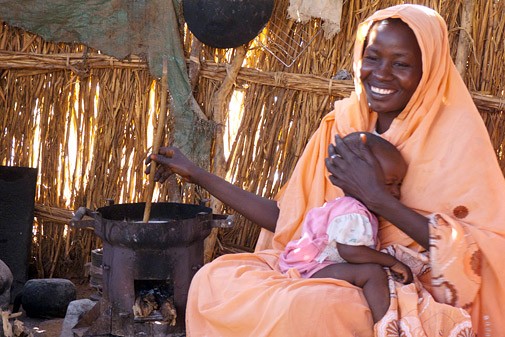- What We Do
- Agriculture and Food Security
- Democracy, Human Rights and Governance
- Economic Growth and Trade
- Education
- Ending Extreme Poverty
- Environment and Global Climate Change
- Gender Equality and Women's Empowerment
- Global Health
- Water and Sanitation
- Working in Crises and Conflict
- U.S. Global Development Lab

Worldwide, an estimated 2.4 billion people depend on biomass fuels (wood, dung, crop residues) to meet their cooking needs and heat their homes, including approximately three-quarters of the households in sub-Saharan Africa and South Asia. The use of these solid fuels in open fires and rudimentary stoves is not only inefficient, but can also result in high levels of indoor air pollution; negative local and global environmental impacts, including global warming; and loss of productive opportunities for women and girls - who usually bear the burden of collecting the fuel.
USAID is working to reduce the adverse effects of household energy use by encouraging families to switch to cleaner, more efficient fuels and technologies. Our programs support the adoption of alternative fuels and affordable stoves that require less fuel to meet household energy needs and release fewer pollutants. These stoves can help us accomplish many international development objectives, such as
- improving health;
- reducing environmental degradation;
- mitigating climate change;
- fostering economic growth and;
- empowering women
Our overarching goal is to develop evidence-based practical approaches to scaling-up and sustaining these interventions.
USAID is a founding partner of the Global Alliance for Clean Cookstoves, and is working closely with the Alliance and other U.S. Government partners to collectively disseminate 100 million clean cookstoves by 2020. Our commitments to the Alliance are concentrated in three primary areas:
- Developing the clean cookstove sector via projects that strengthen the business operations of cookstove enterprises and encourage private sector participation;
- Increasing understanding of consumer needs and preferences, in order to help the global community bolster adoption of clean cookstoves and reduce exposure to indoor air pollution;
- Working with financial institutions to increase private-sector finance available to consumers seeking to make cookstove purchases and enterprises working along the cookstove supply chain
The following table summarizes the programs that constitute USAID’s commitment to the Global Alliance for Clean Cookstoves:
| Region | Program Descriptions | Implementing Partner | Years |
|---|---|---|---|
| LATIN AMERICA & THE CARRIBBEAN | The Haiti Improved Cooking Technology Program seeks to establish a commercial market for efficient household charcoal stoves, and convert commercial food vendors to liquid petroleum gas (LPG) | Chemonics International | 2012-2015 |
| ASIA |
The Water Supply, Sanitation and Hygiene (WASHplus) program is assessing consumer needs, preferences and willingness to pay for fuel-efficient biomass stoves in Bangladesh and Nepal, and will develop strategies to improve clean cookstove dissemination |
FHI360 | 2010-2015 |
|
The Translating Research into Action (TRAction) project is funding randomized control testing of behavior change communications to reduce indoor air pollution in India, while increasing the dissemination and use of cleaner-burning cooking technologies |
Duke University | 2011-2014 | |
|
The Partnerships for Enhanced Engagement in Research (PEER) is supporting research in Nepal to determine how cookstove technologies affect the incidence and prevalence of acute respiratory infections such as pneumonia in children under five. If successful, this study will provide crucial evidence that levels of household air pollution (HAP) directly influence child health. |
National Tuberculosis Center and University of California, Berkeley | 2014-2017 | |
|
The Catalyzing Clean Energy in Bangladesh (CCEB) project is working to identify appropriate technologies and support market development for improved cookstoves. |
Deloitte Consulting LLP | 2014-2017 | |
|
A randomized control trial in India is measuring the impact of four economic and marketing tools aimed at reducing barriers to adoption of a cookstove that contains a USB charger allowing excess energy produced while cooking to charge small electrical devices. |
BioLite LLC | 2013-2015 | |
| AFRICA |
Two TRAction-funded projects are testing various marketing and payment mechanisms while establishing local production and dissemination of gasifier stoves in Uganda |
Impact Carbon and PATH | 2011- 2014 |
| Cookstove marketing and distribution channels are being developed to serve displaced populations in Ethiopia and the Darfur region of Sudan, with the aim of establishing a self-sustaining stove distribution organization in a humanitarian context | Potential Energy, Inc. | 2012-2015 | |
| Fuel-efficient stoves are being provided to host communities of the Kakuma refugee camp in Northern Kenya. The program will seek to evaluate the relationship between the use of fuel-efficient stoves and women’s and girls’ risk of exposure to gender-based violence during fuel collection | World Food Program | 2012-2013 | |
| Energy efficient stoves are being produced locally for use in schools and other institutions in Lagos and Ebonyi states. | International Centre for Energy Environment and Development | 2012-2015 | |
| The Developing a Sustainable Cookstove Sector program is working with the Kenya Union of Savings and Credit Cooperatives (KUSSCO) and Micro Enterprises Support Program Trust (MESSPT) to develop new financial products for customers and distributers of efficient stoves. The program is also working with Burn Manufacturing and Boma Safi to help these firms scale production and distribution of efficient stoves in Kenya. | Winrock International | 2012-2016 |







Comment
Make a general inquiry or suggest an improvement.